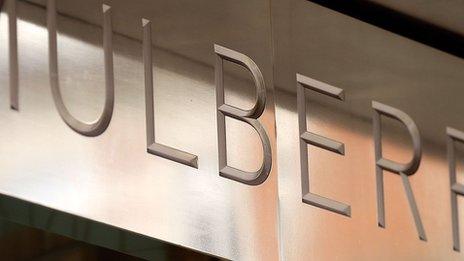West End luxury brands see Games boost
- Published

The British luxury goods company Mulberry is among those benefiting from well-heeled visitors to the Olympics
London's West End retailers saw a 13.5% year-on-year increase in customers visiting its shops on the day of the Olympic Triathlon, led by luxury brands.
Experian, which is tracking London's weekly footfall throughout the Olympics, said the event brought spectators away from Stratford and into the city's main shopping districts on Tuesday 7 August.
Those spectators "subsequently dispersed into nearby shops", said Experian.
Retail figures throughout the first few days of the Games showed a decline in performance, and retailers bemoaned the lack of traffic and shoppers in central London.
But the signs are that this is improving in the second week of the Games, and it is the West End's luxury brands that are supporting sales.
While Experian said that the West End saw a 13.5% uplift in footfall on the day of the Triathlon, East London - the area that is home to the Games and the new Westfield shopping centre - saw footfall shrink 8.3% year-on-year on that day.
British luxury
The West End stretches from the northern bank of the Thames river, at Victoria Embankment, through Piccadilly Circus and Oxford Street, to the Eastern boundary of Hyde Park.
It is home to 2,500 restaurants and bars, 2,000 shops, according to the West End Partnership, which clubs together the various property firms and business operators covering the area.
Mark Henderson, director for Walpole, an association of British luxury brands including Mulberry and Alexander McQueen - many of whom are based in the West End - told the BBC that footfall across luxury brands in the West End increased by 13.1% in the first weekend of the Games.
"It is rebuilding, though it is hard to compare year-on-year because it was this time last year that the London riots were going on," Mr Henderson said.
Mr Henderson added that luxury brands, especially identifiably British ones, have been doing "very well over the Olympics so far".
He believes that has been driven by wealthy American and Chinese tourists in London for the Olympics, and that high-end gifts such as bag, jewellery and watches are proving popular throughout the Games.
'Exclusive'
Mr Henderson's views are supported by Jace Tyrrell, director of communications for the New West End Company, an organisation that promotes business in the West End.
"We are seeing a lot of people coming into town to go shopping after being at the Olympics. It helps a lot that the Tube is running later throughout the Games," said Mr Tyrrell.
"And luxury goods are doing well in pockets - those travelling here with Olympic sponsors, or International Olympic Committee VIPs for example, are quite happy to go shopping in Mayfair to find exclusive pieces - high revenue pieces. The Burberry bag or a pair of designer shoes," he added.
"I would say between luxury goods and bread-and-butter goods, luxury is doing slightly better in the West End."
Quiet transport
Experian's data showed that footfall in all London stores on the day of the Olympic opening ceremony was 10.4% down year-on-year, and dropped further to 11.7% the day after, a Saturday.
Whereas everyday retailers in London have complained that the Olympics has hurt their business, luxury goods retailers are not as reliant on high footfall.
Some even think that the far quieter tube and bus journeys locals are enjoying - as commuters heed Transport for London warnings to change their travel habits during the Games - encourage those seeking a high-value purchase into the Mayfair, Park Lane, Bond Street and Chelsea enclaves where luxury retailers reside.
That said, New West End Company's Jace Tyrrell expects Bond Street and Regent Street - the latter a more accessible but still higher-end shopping street to the former's iconic designer boutique destination - to both do well in the second half of the Games.
"We know that it's the trend for sales to pick up in the second half of an Olympic games, as athletes complete their Games," says Tyrrell.
"We expect to see athletes coming into town to catch a show and to get some shopping then."
Walpole's Henderson expects the UK luxury sector as a whole to grow by 8.5% for the full year 2012, and adds that "most of the Olympic uplift will be in the years after the Olympics, if we follow the trend of the Beijing Olympics," said Mr Henderson.
But Helen Dickinson, head of retail at accounting firm KPMG said it was "doubtful" the lacklustre retail performance at the start of the Games would improve.
"Early expectations that the Olympics will raise retailers' fortunes look to be wide of the mark. Central London's retailers are already being hit hard by shoppers actively avoiding the capital. It's likely that any blip of benefit the games bring will be short lived," said Ms Dickinson.
- Published8 August 2012
- Published7 August 2012
- Published3 August 2012
- Published31 July 2012
- Published30 July 2012
- Published22 July 2012